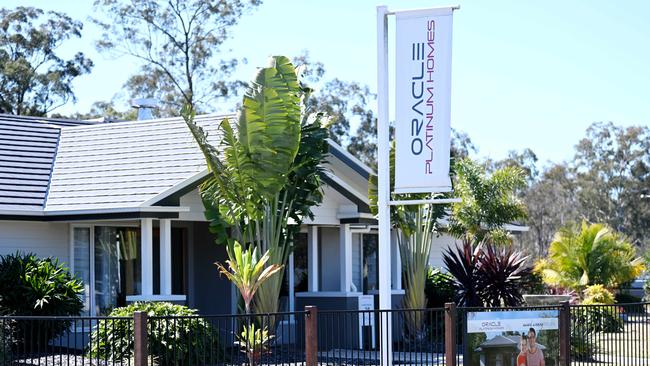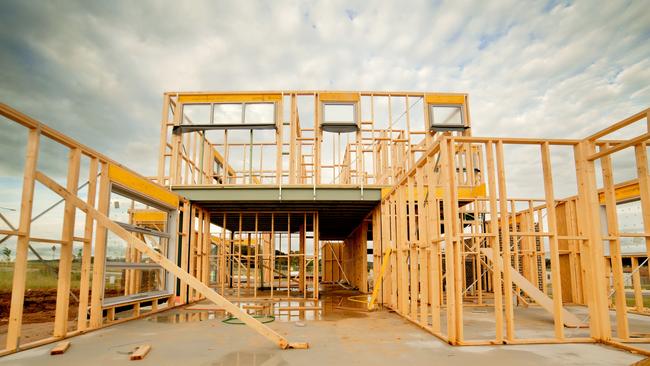Oracle liquidator issues dire warning over relentless cycle which could see more construction companies collapse
A global shortage of building supplies is creating a “vicious circle” of distrust that is fuelling Australia’s devastating construction industry crisis.
Companies
Don't miss out on the headlines from Companies. Followed categories will be added to My News.
A global shortage of building supplies is creating a “vicious circle” of distrust that is fuelling Australia’s devastating construction industry crisis.
A spate of builder companies have gone under this year, while developers are increasingly being forced to axe projects as they deal with surging construction costs and labour shortages.
Queensland residential builder Oracle was the latest to go into liquidation on Wednesday, leaving 70 staff out in the cold and halting 300 homes that were in the pipeline.
The director of the liquidation firm that’s taken over the assets of Oracle issued a grim warning about a major problem plaguing the building sector.
“People won‘t pay the company because they are worried about not getting supplies, the company won’t get its money so they can’t pay their supplier,’ Bill Cotter, the Director of Robson Cotter Insolvency Group, told Daily Mail Australia.
“Their suppliers don’t get their money so they don’t provide the goods or the subbies (subcontractors) don’t do the work. A homeowner won’t pay the next instalment, so it is a vicious circle.”
Mr Cotter also said increasing material costs were to blame, with product delays occurring as a result.

Construction crisis
The crisis has been caused by a perfect storm of supply chain disruptions, skilled labour shortages, skyrocketing costs of materials and logistics, and extreme weather events.
Another Queensland builder, Besse Construction, collapsed only last week owing $1.7 million.
Earlier this year, two major Australian construction companies, Gold Coast-based Condev and industry giant Probuild, went into liquidation.
In July, Snowdon Developments was ordered into liquidation by the Supreme Court with 52 staff members, 550 homes and more than 250 creditors owed just under $18 million, although it was partially bought out less than 24 hours after going bust.
Others joined the list too including Inside Out Construction, Solido Builders, Waterford Homes, Affordable Modular Homes and Statement Builders.
Then there was NSW building company Willoughby Homes, which went into voluntary administration last week, leaving at least 30 homes in limbo.
Also shuttered was Norris Construction Group, which was in Geelong, collapsed in March with $27 million in debt. It owes $3.2 million to around 140 staff that it is unlikely to be able to repay, according to the liquidator’s report.
Plus there was Melbourne-based company Blint Builders that collapsed with approximately $1 million in outstanding debt owed to 50 creditors, according to the liquidators.

Axed projects
Other Australian developers have faced difficulties in recent times, axing projects and blaming skyrocketing construction costs and labour shortages.
Perth developer Sirona Urban killed off a $165 million luxury tower, where more than 50 per cent of apartments had been bought off the plan, which was set to one of the tallest apartment buildings in the state.
Sirona Urban owner Matthew McNeilly said in July construction costs had risen by 30 per cent in the past 10 months, while a shortage of tradies were also causing problems.
In the same month, Melbourne developer Central Equity abandoned plans to build a $500 million apartment tower on the Gold Coast blaming the crisis in the building industry and surging construction costs for making the project unprofitable.
Earlier this month, a $180 million development in Brisbane which was set to deliver 250 homes, was shelved by developer Cedar Woods, blaming rising costs, labour shortages, significant rainfall events in Queensland and extended construction timelines.
One homeowner described the development company’s decision as an “absolute joke” claiming that it would leave his family financially “screwed”.
Factors behind crisis
Master Builders Gold Coast regional manager Adam Profke said a number of factors were playing a part in the issues the construction industry was facing.
“It started off with Covid and people slowing down in terms of building activity, then we had some stimulus that kicked off activity and increased demand,” he told news.com.au in June.
“Covid restrictions meant people weren’t travelling and so were saving money so they decided to put this money into their homes, driving the renovations market. But because of Covid the supply of materials reduced.”
Mr Profke said demand for products had been completely outstripping demand – and this was before Russia’s invasion of Ukraine created even more issues.
Delays in getting materials due to both the Ukraine conflict and Covid restrictions meant builders could not complete as many projects as they did previously, and the costs for the materials were also increasing.
“If normally you build 10 houses a year … but you are only doing two or three, you lose profit and money,” he said.
“The hammer blow is the fact that what you budgeted to build the house for, can’t be delivered for that, it costs more and also eats into your profit.”

Mr Profke said the price of timber and reinforcing steel had gone up by nearly 100 per cent in the last 12 months. Other big ticket items had gone up by 40 or 50 per cent.
“We’re seeing price rises on a monthly basis, and while it has slowed since last year, we are still seeing prices rise for something new every month,” he said.
This is partly because of Australia’s heavy reliance on materials from overseas for its home construction projects.
“At one stage during Covid lockdowns you couldn’t buy a door handle or lock from Bunnings, which was almost unheard of,” Mr Profke said.
“Unfortunately there is delay in almost every item in the supply chain for construction across the board as the bulk of what we use does come from overseas.”
Unfortunately, Mr Profke believes more businesses could collapse.
“We hope for the best but we also have to be realistic – some businesses won’t be able to sustain the losses continuously,” he said.
“I think every business will be at risk at some point, it doesn’t matter whether they are big or small, the businesses that can manage their risk better will be able to sustain it better in the long run.
“There’s not one builder in the industry that hasn’t suffered some kind of financial loss as a result of what’s going on at the moment.”
The irony is that demand for their building services continues to be high.
“The work is there, particularly in Queensland and the Gold Coast, there’s plenty of demand in the industry, it’s just a matter of getting through the backlog of work,” he said.
Originally published as Oracle liquidator issues dire warning over relentless cycle which could see more construction companies collapse




